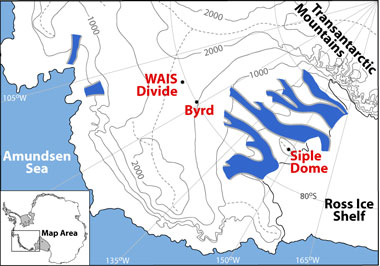I don’t know what the dog in the kudzu patch is looking for, but scientists down in Antarctica are digging for something of vital interest to us all….more information about global warming.
Most scientists agree that the world is warming up. The question is how much of that current warming is due to human activity and how much is simply natural variation. Scientists have been trying to guess how temperatures have changed in the past by looking at tree rings, harvest records, and sediments in seas and lakes. The trouble is too many assumptions have to be made for all scientists to agree.
As Mining for Cold, Hard Facts explains, American researchers are taking ice cores at the WAIS (West Antarctic Ice Sheet) Divide, 600 miles from the South Pole, to see what the climate has been like for the past 100,000 years. Researchers will especially be looking at the relationship between the greenhouse gases and temperature changes.
I think it’s a great way to shed more light and less heat on the global warming issue. What do you think?



Oh yes, I’m tired of hearing about global warming & it’s devastation. Hope something better is shown.
No surprises for me in the article.
I was glad to see mention of the Middle Ages warming (Medieval Warm Period) and the Little Ice Age, both of which were dropped from prominent figures in the last two IPCC assessment reports. I was going to mention the 800 year lag in CO2 change following temperature change… but the article covered it.
Good, balanced main-stream-media article from what I can tell — simply amazing!
.-= Mike´s last blog ..Kite Surfer =-.
bikehikebabe,
I don’t pay much attention to the rhetoric. I’m just glad they’re continuing to try to understand what’s really going on.
Mike,
The Wall Street Journal isn’t as good as it was a few years ago but they still produce some well-researched articles. Of course, the price has gone way up too. It’s now $363/year for the print edition, more if you want the online version too. Research costs money and the advertising dollars have shrunk.
I thought of you when I read the article and wrote this post. 🙂
Whether it is human caused is, finally, a distraction.
The climate is changing – if we don’t respond the devastation will be human caused.
Accept.
Evan,
Some people think we can lessen the devastation if we do something to reduce greenhouse gases. And since some warming will probably occur whatever we do about our production of those gases, do we know what the best ways of coping are? People living on low-lying islands are going to have different preferences than people living in Siberia. One thing is certain, people are going to have, are already having, conflicting ideas.
Rummuser,
What exactly do you mean by “accept”?
Yes, there will be lots of environmental refugees.
I think we need to address food growing – when the rainfall patterns alter this is going to get difficult. Reviving backyard and suburban sustainability is one way to get ideas and make a start.
Another is to opt for alternative power whenever possible. Another is if at all possible to get rid of the car – and if not get the least emitting possible.
Lifestyle alteration: spend time with friends, enjoy reading, go hiking or walking or play sport. These things aren’t exactly big sacrifices.
No doubt many disagree. This isn’t unusual – but we manage to do much in this situation.
The No Impact Man blog and project are interesting I think.
Suburbs as currently practised won’t be viable in a few years (due to depletion – and so rising cost – of oil not global warming). This is worth thinking about. It may have beneficial effects on global warming.
Evan,
I prefer the simple life, one that doesn’t require using the automobile very much, so I’ve just about always lived the life you’re talking about. I’m wondering if people in the developing nations would agree with us. In a recent comments at Mike’s blog Rummuser wrote:
I don’t know if Rummuser really meant that, but my guess is a lot of people would agree with those words. And don’t forget, the world population and human activity continue to increase.
I don’t know about Mike but it sounds stupid to me. And not dealing with reality, even by name calling – ‘sanctimonious’ – doesn’t achieve much.
Accept climate change, accept increased carbon emissions, accept ice caps melting and sea levels rising and islands and coastal settlements disappearing, accept that humans will destroy themselves sooner than later.
.-= Rummuser´s last blog ..Asking For Trouble. =-.
Evan,
The definition of “acceptance” I like best is “the willingness to perceive reality”. I’m with you, that doesn’t mean being completely passive. For me science is a way of correcting the simplistic stories we tell ourselves about reality. The problem is it takes a lot of time, time the global warming activists say we don’t have. Their opponents say they don’t know enough to know that doing what the activists propose won’t do more harm than good.
Mike has been trying to understand the facts and has had some good blogs on the subject. What do you think, Mike? Should we do anything besides try to understand?
Rummuser,
“…accept that humans will destroy themselves sooner than later.” And accept the fact that the militant Islamic movement satisfies the psychological needs of a large number of people and will do its part to accelerate that destruction? 🙂
I think that understanding the “facts” is central to making good decisions. Unfortunately, 🙁 we’re being asked to mortgage our future on science that is not settled, science that has been cobbled together by a core of agenda driven scientists that never did really consist of a consensus… who also had to use some tricks to “hide the decline.” (Besides, science is not done by consensus.) 😉
.-= Mike´s last blog ..Kite Surfer =-.
Mike,
Yep, I don’t like making huge decisions on the basis of agenda-driven science either. It horrifies me even more when they start talking about geoengineering…manipulating the earth’s climate. Some of those schemes are relatively benign but some are bound to have serious side effects. Science News just had a good article on the subject. I especially like the ending :):
Back to cutting emissions. Do you agree with Rummuser that developing nations like India and China shouldn’t worry about it at all, that they should continue developing their power and automobile sectors and let the chips fall where they may?
The bases for cutting emissions assume that the climate system is very sensitive to changes in concentration of carbon dioxide. Some current research indicates that man-made global warming is overestimated by a factor of about 5 and that it is the climate system itself that is causing the climate to change. If this is true, nothing that mankind does is going to substantially affect global climate. Given that life on Earth is dependent on a very tiny amount of CO2 in the atmosphere, is emissions reduction truly a positive goal?
I think that resposible local and regional total pollutant emissions control is the right thing to do from the perspective of local and regional health and welfare. Failure to do so can and will produce local and regional conditions that are very horrific to the inhabitants.
Despite the EPA endangerment finding, carbon dioxide is not a pollutant. I, personally, have survived , for extended periods, carbon dioxide levels several times the current average atmospheric concentration, which, I believe is somewhere around 350 to 370 ppm. The atmospheric CO2 limit inside a submerged US submarine is several thousand ppm.
.-= Mike´s last blog ..Kite Surfer =-.
Jean, that is also a climate change!
.-= Rummuser´s last blog ..Asking For Trouble. =-.
Mike,
You’re preaching to the choir here…I’ve been a longtime supporter of groups advocating for clean air and water. My favorite organization is New Mexico Citizens for Clean Air and Water. They do little publicity but instead study issues and give expert testimony at regulatory hearings. They’re not anti-business so have credibility when businesses say they can’t afford antipollution measures.
Rummuser,
Trying to understand whether or not reducing fossil fuel use would help reduce global warming is less complicated than trying to understand the impact of geoengineering schemes, I think. They both rely on computer simulations, which happens to have been my career. We were always trying to get feedback from the real world to test our models.
Should you and I worry about climate change? We may be long gone before the answers come in. I keep remembering what one Keynesian economist said during Roosevelt’s New Deal: “Who cares about the long run. In the long run we’ll all be dead.” Not a very responsible approach, but one that we humans often take. 🙂
Jean, you may be interested in a post by Dr. Roy Spenser on his blog, “Warming in Last 50 Years Predicted by Natural Climate Cycles.” He used a statistical model that looked at temperature changes after changes in 3 natural climate oscillations: Pacific Decadal Oscillation (PDO); Atlantic Multi-decadal Oscillation (AMO); and the Southern Oscillation Index (SOI). Interestingly, the results track the last 40 years of temperature change quite closely.
Unfortunately, since it’s difficult to predict with any precision what these oscillations are going to do, it’s unlikely that this statistical model will be much help in long range climate prediction.
.-= Mike´s last blog ..Kite Surfer =-.
Mike,
Thanks! Yes, the system is so complicated that it’s impossible to predict with any great accuracy. I still remember our physics problem sets. They always had to make completely simplistic assumptions in order for us to solve the problems. One of my favorite jokes is
I imagine it’s a joke only a physics major could love. 🙂
Actually, that is rather humorous, but, then, I’ve had a little exposure to physics simplifications through the reactor theory I learned years ago.
.-= Mike´s last blog ..Kite Surfer =-.
Mike,
You’ve clearly had enough to get the main point— that a lot of simplifications need to be made when modeling a complex system. Scientists are usually laughed at for being too wishy-washy, for not being definitive enough. And for being too interested in boring facts. Don’t Be Such a Scientist talks about this problem. The author said you sometimes need to simplify to get your point across. The whole global warming controversy shows the downside of that approach. Sometimes scientists just can’t win. 🙂
I’ve been laying off the “science” lately, concentrating instead on history. In my new project, some of my pre-posted material is now scheduled as far out as July, 2012. Lots of work yet to go and, while I still read a bit on it, not much time to concentrate on studying climate. The subject — not the science — is settled so far as my concerns and I’m moving on to other interests.
.-= Mike´s last blog ..Kite Surfer =-.
http://www.climatechange.govt.nz/
and then the new tax! on emissions…coming into force real soon!
http://www.scoop.co.nz/stories/BU1004/S00546.htm
I haven’t commented, because gov’t is always thinking up new money making schemes…oops taxes to deal with whatever. And this seems to be a key scheme of the momenti 🙂
.-= Cathy in NZ´s last blog ..Classes finished but still 1000s of words to GO! =-.
Cathy,
Yes, I have read that emissions taxes will be popular with the politicians. More money for them to spend. Thanks so much for the links. 🙂